BBC's Blog, page 13
August 2, 2013
What's on BBC Red Button 3 - 10 August
The school holidays are finally here and the BBC Red Button has something for all ages this week. CBeebies kicks off the summertime with a jam-packed offering of adventure and intrigue, alongside our usual generous portion of sporting action and unmissable live music. Ensure you don’t miss a moment of the fun with this week’s Red Button highlights.

Let's have some fun!
Big Fun Time
Press red this summer for big fun time, all the time! Watch Alex as he goes on an adventure with Jem and the naughty Swashbuckle pirates aboard the Scarlet Squid, join in with a special Nina and the Neurons experiment and sing along to the Big Fun Time song. Just press red!
Available on all platforms
Fri 9th August, 6am – 7pm
Sat 10th August, 6am – 6pm
This week's sport highlights
Live action from the World Swimming Championships in Barcelona continues this weekend, from 5pm on Saturday 3 August and Sunday 4 August.
Keep the Olympic flame burning by joining a celebration of ‘Super Saturday’ on Saturday 3 August at 7.25pm, marking the day Jessica Ennis, Greg Rutherford and Mo Farah all won Olympic gold in the space of 46 minutes at the London Games.
There’s news and action from rugby league's Super League from 2.40pm on Tuesday 6 August, and the Football League Show returns on Saturday 10 August, showcasing all the latest drama and all goals from the Football League.
Round off the week with the Athletics World Championships, where a host of legendary athletes bring all the track and field action live from Moscow, as athletics returns to the global stage. Coverage starts at 6.30pm on Saturday 10 August.
Available on all platforms
Note that live sport event times are subject to change. For more information on this week's Sport on Red Button, visit the BBC Sport website.
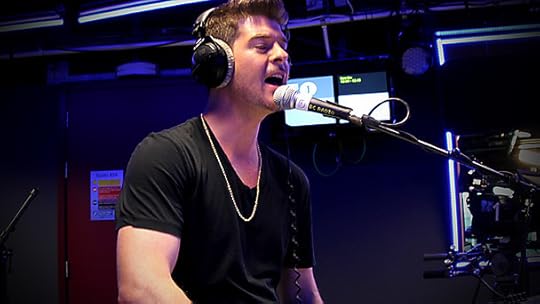
Robin Thicke in the Radio 1 Live Lounge
Live Lounge
Radio 1’s Live Lounge TV brings you the very best in stripped back live music performances from the world famous Live Lounge. This month Alice Levine has Robin Thicke, Queens of the Stone Age, Vampire Weekend, Crystal Fighters and Nina Nesbitt performing their own songs and some truly incredible cover versions.
Available on all platforms
Mon 5th August, 12pm – 9.55pm
Tue 6th August, 4am – 6am
Tue 6th August, 6am – 2.40pm
Tue 6th August, 4.10pm – 6.30pm
Tue 6th August, 10pm – 12.15am
Wed 7th August, 4am – 6am
Wed 7th August, 6am – 7.30pm
Wed 7th August, 9pm – 6am
Thu 8th August, 6am – 6am
Fri 9th August, 7pm – 6am
Bottom of the Lake
Go behind the scenes with Top of the Lake creator Jane Campion. In this personal and insightful exploration, discover how against all odds, the creative spirit can sing. Discover the themes at the heart of the ‘Top of the Lake’ story and how they compare to artistic processes in filmmaking anywhere in the world.
Available on all platforms
Sat 3rd August, 10.05pm – 12:55am
Sat 10th August, 10.05pm – 12:50am
Latitude Festival
It’s your last chance to catch the fun and frolics of this year’s Latitude Festival this week. Don’t miss the legendary Kraftwerk or sets from a variety of huge acts including Bloc Party and Hot Chip.
Available on all platforms
Sat 3rd August, 6am – 2.30pm
Sun 4th August, 7.30pm – 6am
Mon 5th August, 6am – 12pm
Don't forget you can follow @BBCRedButton on Twitter.
August 1, 2013
Travel beta: a new version of the BBC travel and traffic website
Hello!
I’m Karolina Iwaszko, executive product manager in BBC Future Media.
Together with the Travel News Team, I am happy to announce that a new version of the BBC Travel website is now available as a beta service.
This means it will run alongside the existing site for the next few months during the ‘beta period’ and will eventually replace it once we’ve fully tested it, added key functionality and given users a chance to give us their feedback.
The first change regular users may notice is that we’ve simplified the name from BBC Travel News to BBC Travel, but we have also completely redesigned the user experience and technical architecture of the service. This makes the site more customisable and easier to use across multiple devices.
For example, the new BBC Travel Beta has been designed to automatically fit screen sizes in a fully responsive way, optimising the site’s layout for any device you access it from, whether that’s a desktop, mobile or tablet:

The Travel beta has been designed to fit most screen sizes in a responsive way
One of the other major improvements is the ability to search for your local town, county or postcode and see the results displayed for the exact location you’re interested in. The new functionality gives users much more freedom and control over the level of detail displayed, as you can now see incidents for specific roads or areas, as opposed to the fixed regions of the existing site.
We have also replaced the static map, which could only show results for predefined areas, with an interactive map. The new map is available for devices with screen sizes above 767 pixels (desktop and tablets), allowing you to view results for any area within the UK and Channel Islands.
You can easily zoom in and out as well as pan from the results page by ‘’grabbing” the map with the cursor and moving it in the direction you want. The interactive map will automatically update the results for the location you navigate to.
If you’re using a device with a screen smaller than 767 pixels, such as a smartphone or a small tablet, you will still be able to view a full list of travel incidents but they will be displayed without the map, making it more user-friendly for on-the-go access.
The BBC Travel Beta includes the core ‘road incidents’ functionality at launch but more features will be added throughout the beta period, for example incidents for other modes of transport, like rail or underground etc. We’ll update this post as soon as new features go live so watch this space for more information, or Iif you start using the Travel Beta site regularly you’ll see them appear automatically.
I hope that you like the new version of BBC Travel and find it more intuitive and easier to use. We’re keen to hear your feedback so please do share your comments with me and the team by commenting on this post, or alternatively contact us at travel.beta@bbc.co.uk.
More detail on how the BBC Travel team designed and developed the beta site will be provided in a future post.
Karolina Iwaszko is Executive Product Manager, BBC Travel
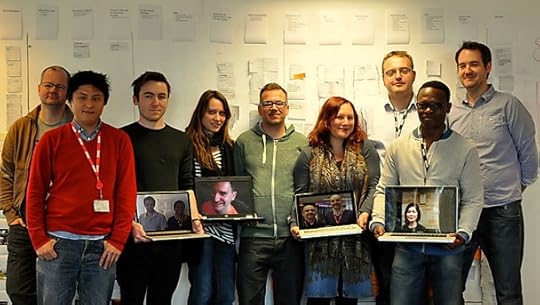
The team who worked on the new travel site
From the left (standing):Chris Rudd, Joe Fung, Tom Mould, Karolina Iwaszko, Jae Task, Amanda Dahl, Marceli Janowski, Tundi Awoyemi, James Cryer
On the screens: Iwan Roberts, Emelie Morah, Paul Rissen, Adil Hussein and Takako Tucker
BBC Sport Kindle app and updates to the iPhone and Android apps
Hello, I’m Ryan Thomas Hewitt – Business Analyst for BBC Sport apps.
Today we’re making two announcements:
i) BBC Sport has released a free app for Kindle Fire devices. This app optimises the BBC Sport experience on Kindle Fire and Kindle Fire HDs.
ii) Updates have been made to improve the BBC Sport iPhone and Android smartphone apps. These updates are also available to Kindle Fire users, and provide access to even more sports news and offer increased customisation.
Kindle Fire app
The Kindle app has been launched in the UK Amazon Appstore, allowing users to follow the latest sports news, scores, video and gossip:

Left: Kindle Fire home page Right: gossip column in Kindle Fire
The Kindle Fire release is part of our efforts to bring BBC Sport to users regardless of what device they are on. We now offer apps in the Amazon Appstore, Apple App Store and Google Play and of course have mobile and desktop browser sites. Because Kindle Fire devices use a version of the Android operating system, we were able to optimise our existing Android app to bring the native mobile functionality app to new users in a highly efficient way.
The Kindle Fire app will be released into the international Amazon Appstores in the coming weeks.
iPhone and Android app updates
We are also offering updates to the iPhone and Android smartphone apps, which will be automatically included in the Kindle Fire app at launch. These updates include access to numerous newly refreshed sports indexes - including athletics, boxing, cycling and snooker. We’ve done this using dynamic configuration (dyno config), which enables the editorial team to update and promote content (e.g. The Ashes) or add new indexes without users having to update their app.
In addition, we now offer iPhone and Android smartphone users the ability to add football teams, sports and nations to the ‘Quick Links’ section, which we know from user feedback is an often requested feature.
The app update also provided the perfect opportunity to make some general improvements, including design tweaks, fixing bugs and improving the speed of loading the apps.
Next steps
With these releases the iPhone, Android smartphone and Kindle apps have feature parity, meaning they all have the latest sports content and customisation features
We are always interested to hear your feedback, which we collect from app reviews, emails, Twitter and elsewhere, and we’re already exploring some of the more popular suggestions, including Android widgets and enabling Radio 5 Live and Radio 5 Live Sports Extra playback.
I’d be interested to hear which features you’d like to see added to the apps and why in comments.
Ryan Thomas Hewitt is a business analyst in News and Knowledge, BBC Future Media
July 31, 2013
Sport Responsive Correspondent Pages
Hi, I'm Will Bamford, a software engineer within BBC Sport.
In this post I want to talk about the release of our new correspondent pages. These pages are the first within Sport to fully embrace responsive web design (RWD) - that is, the pages adapt to the device they are presented on whether that is a mobile, tablet, desktop or anything else inbetween.
We believe this is something of a milestone for Sport as these are our first "fully responsive" pages. More on this later, but first let's highlight an example - Andrew Benson is BBC Sport's Formula 1 correspondent:

Andrew Benson's correspondent page on different screens
These pages serve as landing pages for our correspondents, surfacing their most recent correspondent pieces (in-depth analysis into their own sporting areas of expertise), together with a short correspondent bio and links to the other correspondents within BBC Sport.
Users of the current desktop offering of these pages may not notice many changes, as they look quite similar to the pages they have replaced. However, if you look under the hood things are very different and in many ways, the journey towards building these pages is more interesting than the destination…
When I first joined the BBC up in Salford almost two years ago I was part of a small team tasked with developing the mobile Olympics 2012 website. Back then, RWD as a technique was gaining popularity with web development community but we had yet to see widescale adoption on websites with significant traffic. We applied some responsive techniques to the Olympics 2012 site, but for various complex reasons the pragmatic approach at the time was to deliver three variants of the site: one for low-end mobile devices ("feature phones"), another for smartphones and a completely separate desktop site. The server decided which "box" your device would best fit and served the most appropriate version of the site.
Whilst we were really pleased with the outcome and the reception was overwhelmingly positive, this resulted in duplication of effort in many areas from design and development, through to testing and maintenance. Additionally, it was a solution that didn't scale in the emerging mobile landscape in which the boundaries between devices was beginning to blur.
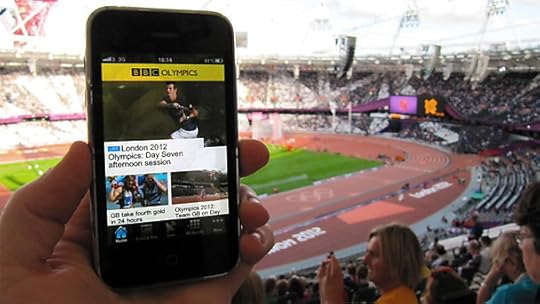
BBC Sport Olympics app
After the London 2012 Olympics, most of the mobile team moved on to developing the new Mobile Sport homepage. We were determined to follow the example of our colleagues at BBC News and use this as an opportunity to "plant the seed for a responsive future".
This was a mobile first approach in two senses:
1.We adopted many of the principles of RWD and applied this to the new mobile site. This has formed the foundation which is allowing us to scale up to larger screens without disrupting the existing desktop web experience. We have been aided in this by sharing knowledge and code with other BBC products such as News.
2.We used this as an opportunity to address our content strategy. The constraints inherent to mobile (screen size, input, connection speed) force you into prioritising what is / isn't important to the user and then focussing on delivering the former. We are using analytics coupled with heat map visualisations, as well as editorial input, to ensure that we deliver a streamlined experience through our fully responsive pages.
For us, mobile first doesn't mean desktop browsers gets left behind. Far from it - the reason we have taken our time applying responsive web design to larger screens is because we want to get it right. We are working hard to address some of the unwanted "signatures" of RWD such as the tendency to produce rigid grid-like designs, the constraints this can place on content order / layout, and the visual flashing / reflow that's often associated with enhancing the page after the initial load (a strategy which is sometimes necessary to keep page weight to a minimum). In addition, we have put in a great deal of effort into ensuring we can deliver our responsive pages to older desktop browsers, such as IE 7 and 8, that do not support some of the core functionality that is often a prerequisite for RWD (e.g. media queries).
We now feel like we are in a great position to build future responsive web pages for Sport, working towards serving all users from a single URL. At which point we can stop talking about "responsive" web pages, and instead go back to talking about web pages...
William Bamford is a senior software enginer in BBC Sport
July 30, 2013
BBC R&D in session: IP based future in broadcasting
BBC R&D has started running a series of events themed around interesting challenges facing broadcasters. We started this at the end of 2012, with a day looking at broadcasting in 2020 - where the industry is headed and what the pitfalls are along the way.
Last week, we held the second event - focusing on the move to an IP based future in broadcasting, looking at content creation, consumption, and distribution.
We held it in Broadcasting House's radio theatre in London, and showcased a mix of speakers from Cisco, Virgin, Sky and the BBC (from both R&D and production departments).
As well as technical experts from these companies, we also heard from James Purnell, Director of Strategy and Digital for the BBC, and Diane Coyle, Vice-Chair of the BBC Trust. The event was chaired by BBC News senior correspondent Nick Higham.
You can view all the videos on the R&D website.
In order to see this content you need to have both Javascript enabled and Flash Installed. Visit BBC Webwise for full instructions. If you're reading via RSS, you'll need to visit the blog to access this content
Nick Higham chairs the discussion with James Purnell, Diane Coyle and Ian Mecklenburgh
The day concluded with a panel session looking at some of the points from the day so far, alongside questions from the audience. The day was filmed and you can see one of the videos below and links to the others on the BBC R&D website.
Running events like this is key to R&D's work engaging with our colleagues and peers, and helps us with our ongoing research into the future of broadcasting.
We'll continue with this series of events. Expect the next one to take place towards the end of the year. Do check the R&D website for more info and please do leave a comment.
George Wright is Head of Internet Research and Future Services, BBC R&D
July 26, 2013
Proms in HD on BBC Red Button

BBC Proms
This year, some of the BBC FOUR Proms
are being made available in HD on the BBC Red Button HD stream.
A total of 12 Proms are going to appear on the special Red
Button HD stream which is available to viewers with a HD TV or set-top box with
Freeview
HD, YouView, Freesat HD
or Virgin Media. Viewers can watch
the additional Proms by tuning directly to these channel numbers:
Freeview / YouView on channel 303
Virgin Media on channel 994
Freesat on channel 980
The BBC Proms that you will be able to see on Red Button
are as follows:
National Youth Orchestra USA - Friday 26 July at 7.30pm
BBC Symphony Orchestra – Sunday 28 July at
7.30pm
Mahler Chamber Orchestra – Thursday 1 August at 7.30pm
BBC Philharmonic – Friday 2 August at 7.30pm
BBC National Orchestra of Wales – Sunday 4 August at
7.30pm
Bavarian Radio Symphony Orchestra – Thursday 8 August at
7.30pm
BBC Scottish Symphony Orchestra – Friday 9 August at
7.30pm
Santa Cecilia – Thursday 15 August at 7.30pm
Bach Oratorios – Friday 16 August at 7.30pm
Hollywood Rhapsody Prom – Friday 30 August at 7.30pm
Tristan and Isolde – Sunday 1 September at 7.30pm
National Youth Orchestra of Great Britain – Friday 6 September
at 7.30pm
What's on BBC Red Button 28 July - 3 August
From butterflies to crime dramas with plenty
of sports action sprinkled on top, the BBC Red Button has something for
everyone this week. Make sure you don’t miss the best of the action with this
week’s Red Button highlights.

Chris Packham, Nick Baker, Michaela Strachan, Ellie Harrison and Martin Hughes-Games
Summer of Wildlife
Join Nick Baker as he reveals the
hidden world of UK butterflies and moths from 26 to 29 July in an exciting
series of live shows exclusively for Red Button and online.
Nick will be revealing the stages
of butterfly and moth lifecycles in extraordinary close-up detail, offering
advice such as how to attract them to your garden or green space and also
asking you to get involved by counting the butterflies and moths you see as
part of a large nationwide survey.
Butterflies and moths are fussy creatures with very specific
needs, and as such they are susceptible to the slightest change. Over past
decades, their habitat and range has shrunk significantly and a recent spate of
cold, wet summers has been disastrous for them. As the BBC's Summer of Wildlife
continues, discover why it has never been more important to give them a helping
hand and how it's possible for all of us to create a butterfly-friendly haven,
even in the smallest of back gardens.
Available on all platforms
Sat 27 July,
6am – 11.55am
Sat 27 July, 12.30pm - 7pm
Sun 28 July, 9.00am - 5pm
Sun 28 July, 8.30pm - 10pm
Mon 29 July, 10.00am - 3pm
This week's sport highlights
Formula 1 is back in Hungary with highlights
from both qualifying and the race on BBC Red Button. Highlights from qualifying
start at 7.30pm on Saturday 27 July and race highlights begin at 7.15pm on
Sunday 28 July.
Watch live action from the World Swimming
Championships from Barcelona. With coverage starting from Sunday 28 July at 5pm.
Discover new talent from teams such as
Manchester United, Liverpool and Newcastle with coverage of the Milk Cup in
Northern Ireland. As the tournament celebrates its 30th birthday
this year, don’t miss any of the action with highlights on Tuesday, Wednesday
and Thursday on the Red Button from 9pm and finals action live from 5pm on
Friday.
Available on all platforms
Note that live sport event times are subject
to change. For more information on this week's Sport on Red Button, visit
the BBC Sport website.
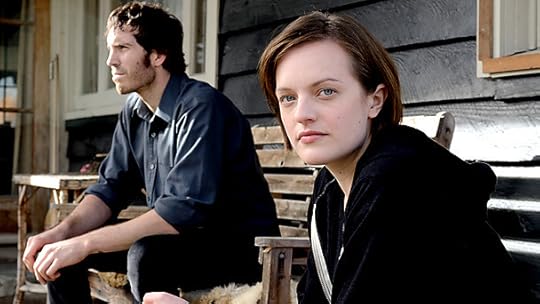
Tom Wright and Elisabeth Moss in Top of the Lake
Top of the Lake
Go behind the scenes with creator
of ‘Top of the Lake’, Jane Campion. In this personal and insightful
exploration, discover how against all odds, the creative spirit can sing.
Discover the themes at the heart of the ‘Top of the Lake’ story and how they
compare to artistic processes in filmmaking anywhere in the world.
Starts Saturday 3 August at
10.05pm.
Latitude Festival
Did you miss all the fun and frolics of
Latitude Festival? With music from electronica legends Kraftwerk as well as
huge acts such as Foals, Block Party, Hot Chip and more, get rocking in your
living room with highlights across the week.
Available on all platforms
Mon 29 July, 11pm - 6am
Tue 30 July, 6am - 10am
Tue 30 July, 11pm - 6am
Wed 31 July, 6am - 5pm
Wed 31 July, 7.10pm - 9pm
Wed 31 July, 11pm - 6am
Thu 1 August, 6am - 5pm
Thu 1 August, 7.30pm - 9pm
Thu 1 August, 11pm - 6am
Fri 2 August, 6am - 5pm
Fri 2 August, 10pm - 6am
Sat 3 August, 6am – 2.30pm
Sat 3 August, 7.25pm – 10.05pm
Don't forget you can follow
@BBCRedButton
on Twitter.
July 23, 2013
Designing BBC internal software tools: iSite and iBroadcast
Hi, I’m Alistair Tearne a User-Experience designer (UX) working at the BBC. I work within the Publishing Tools team at the BBC with Jay Heal, UX designer, and Joanna Attree, UX Architect.
So, those BBC articles you read, and those iPlayer episodes you watch, how does all that stuff end up online? Is there a big machine that takes video clips, articles, images, and audio and spins them together into order; steam cleans and irons them into crisp processed content?
Well, that’s sort of how it is! We have a selection of internal software tools that staff, journalists and production teams use to create and manage content that you find on BBC Online, and applications on mobile and TV. iBroadcast and iSite are two of these. They are two of the BBC’s most vital tools used to output programmes, video clips, audio and images, and in the case of iSite, pages for programme sites such as Top Gear, The Voice, Eastenders, CBeebies, and Desert Island Discs. Even this blog post was published using iSite.

iBroadcast and iSite logos
What is great about software design is that we’re solving problems for users close to us. There are over one thousand BBC staff members who rely on iSite every day, and over two thousand who use iBroadcast. Amongst other things, our job as UX designers involves identifying and designing solutions for user needs. If we can make something more intuitive, we might improve the working lives of our colleagues. And if they can work more efficiently, they can offer better content to you!
So, what are the challenges of designing such software?
Software design is complex. Even with a strong voice from the product owner, the detail around interaction patterns and behaviours can be lost-in-translation between Business Analyst, Designer, and Developer. Involving the wider product group in ideation and documentation has proved essential for establishing a shared vision of the product, and we found Gamestorming an incredibly useful set of techniques for collaborative working.

Using Gamestorming techniques
One style fits all?
Many of our content producers and editors switch between iSite and iBroadcast for various tasks. It’s important to remember, therefore, that as a suite of products, the interaction patterns, visual style, and behaviours are as consistent as possible. The more intuitive we make our products, the more trust there will be in any given workflow.

iSite and iBroadcast headers and main navigation
iSite is currently undergoing a complete redesign. The current version, built on the open source Alfresco framework, worked well for several years but is no longer able to keep up with the evolving requirements of the BBC. It will be replaced with the brand new iSite 2, built completely in-house, with a well-defined and finite list of requirements. iBroadcast 2, however, is an evolving product. Designers have joined and left the team over the years and they’ve all left their mark on the design. It would be amazing to start afresh, bringing both products inline. But, with iBroadcast’s short releases and growing list of requirements (see Mathew Browning’s post), this would cause more pain to the user.
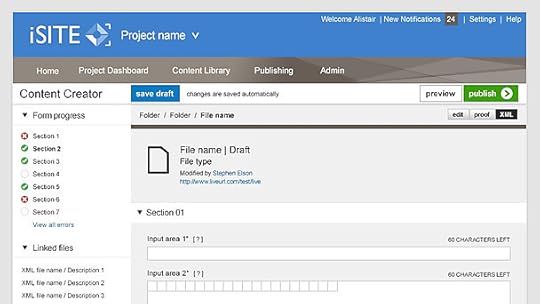
The new iSite interface
So, we’ve had to audit, consolidate and refresh the design of iBroadcast, whilst being aware of a growing base of existing user habits. It’s dangerous to change a button style, or workflow navigation, when the user has grown so used to it. Furthermore, each product has its own mechanics. The unifying style guide needs to unite a suite of tools, yet remain loyal to the user’s understanding of its functions. After all, we want to greatly improve the experience of the product, whilst minimising the learning curve.

Example of the style guide
User testing is vital for this purpose. We test little and often, and validate our design assumptions to ensure we’ve understood each problem. We use paper prototypes, clickable PDFs, and occasionally, coded prototypes. Often, what you think may be a successful design can fail when tested, so although we aspire to a single visual style guide and set of interaction patterns, being fit for purpose will always come first.
This is a small insight into the work we do as User Experience Designers, and the world of internal software. We’re continuing to learn and improve our design techniques. Let us know if you want to hear more about our work.
Alistair Tearne is a User Experience designer in UX&D, BBC Future Media
July 19, 2013
Links: BBC Sport Redirect, Connected Studio
Some recent nuggests of information about the BBC's online activities which you may have missed.
BBC Sport have introduced a new way to view the BBC Sport home page on your mobile. Ben Gallop, Head of Sport Interactive is quoted:
"The redirect is in response to the changing audience trends which now see more than a third of our audience accessing the website via their mobiles every day."
The Connected Studio initiative continues to provoke enthusiasm:
Will Saunders has created a Storify page with lots of pictures from this week's Connected Studio about comedy. Here's one:

Digital Agency Storythings shoot scenes for their pitch at the Comedy Connected Studio
Simon Hopkins of Turner Hopkins consultants has written a lengthy report about the recent Connected Studio which focused on the Commonwealth Games:
"Given that both innovation in general and the building of relationships between large companies and small suppliers are notoriously thorny areas, the CS process is relatively straightforward. A one day “Creative Studio” (of which this is an example) is an intensive session aimed at selecting a handful of potential projects to take through to the second stage, the “Build Studio”..."
The BBC's Annual Report released this week contained a page of information about the performance of BBC Online.
Yesterday the BBC User Experience Research Partnership was announced, a long-term collaboration project between BBC Research and Development (BBC R&D) and leading universities. According to the press release the technical scope of the partnership includes:
"Designing for New Interaction: Moving beyond gesture and voice to develop new ways of controlling and displaying digital content for more natural and engaging interfaces."
The BBC's Knowledge and Learning product is looking for interactive proposals exploring new perspectives about the First World War. The brief is in the form of a PDF.
It's a bit short notice but BBC R&D are holding an event on Monday in London called "R&D in Session: IP in broadcasting – from creation to consumption". From the EventBryte page it looks as though there are still places available.
And finally Paul Bennan has written a blog post called "Heat Death, Crap Systems, How Connected Studio Will Save The BBC". Sample quote:
"Look — what I’m suggesting with this hopelessly over-egged-pudding-metaphor-thingamy is this: in 2013, inefficient human behaviour and server behaviour are functionally indistinguishable to the systems around you, and natural selection wants you dead."
As always, just because I've linked to something does not mean either I or the BBC agree with it.
Have a sunny weekend!
Nick Reynolds is Editor, Internet blog
College of Production Round up: Blue Room and Digital Cardiff
I’m Denise Roach, content producer at the BBC College of Production (CoP) website.
Our site is a free online learning resource for the radio, television and online production communities offering videos, podcasts and articles from broadcasting innovators and experts.
From connected TVs to consoles, tablets to smart phones, knowing what kit to buy and how best to watch or listen to your favourite programmes has changed quite a bit. How we consume TV and radio just isn’t that straightforward any more – a good thing, maybe, for ordinary punters who now have more choice – but a challenge for programme makers faced with constantly shifting technology and changing consumer tastes.
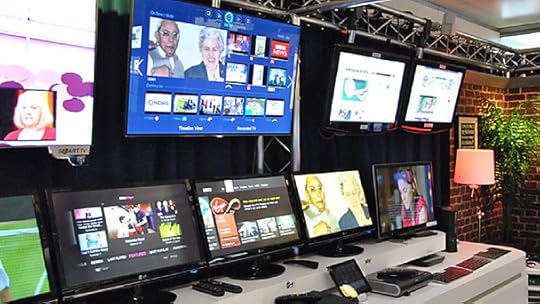
Inside the Blue Room
This is where the BBC’s Blue Room comes in – a brilliant consumer technology showcase that gives programme makers a chance to explore and raise awareness of what technology can offer. We took a stroll round the Blue Room in our latest podcast this week, and looked at new camera capture technology, 4k and 16k television, and chatted about how creating interactive experiences could help programme makers compete in a tough market. And – in case you missed the BBC’s recent announcement – we even sounded a spookily well-timed death knell for 3D …
Talking of interactive experiences, I also took a trip to Wales to attend Digital Cardiff, a week-long event looking at the digital future of the creative media industries in Wales. I went to the open session Innovations in interactive drama, where award-winning innovators in drama production discussed what works and what doesn’t across traditional and digital platforms right now.

There was a lot of talk of rabbit holes
There was a lot of talk of ‘rabbit holes’, ‘snapshot storytelling’ and ‘play God interactivity’. Ultimately, the focus was on how the platform – and YouTube in particular – is beginning to dictate the form, moving traditional drama into the digital space. There were great examples from Doctor Who and Sherlock, where short YouTube clips are used to attract a wider audience and social media speaks to them directly, whenever and wherever they want to engage.
There are of course platforms other than YouTube. Radio producers now post content on sites like Soundcloud, Audioboo and Mixcloud. There were some great examples of this in our podcast on Short Cuts, Radio 4’s s short-form documentary show, which makes vivid use of sound, music and intriguing production techniques to showcase interviews and documentary pieces from the UK and beyond. Colleagues Ben and Sophie spoke to the team and found out how they sourced and created these beautiful stories – listen to an example here.
Denise Roach is content producer for the BBC College of Production
BBC's Blog
- BBC's profile
- 28 followers



